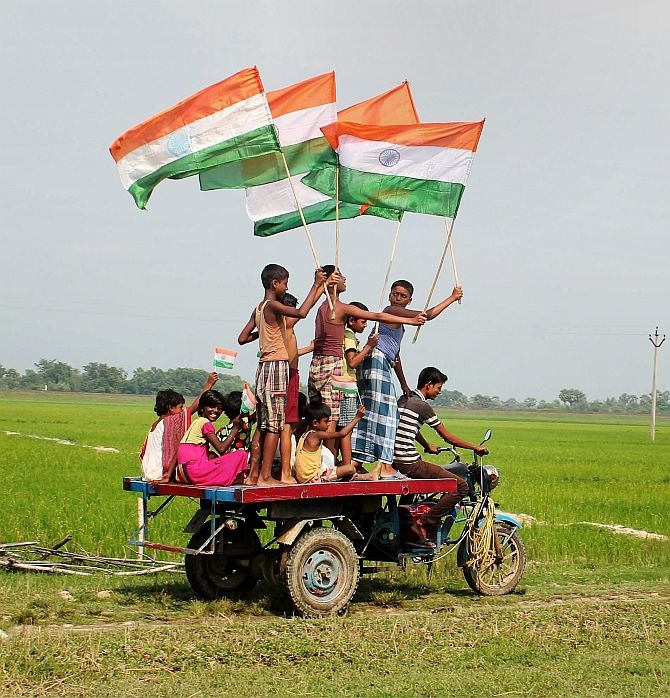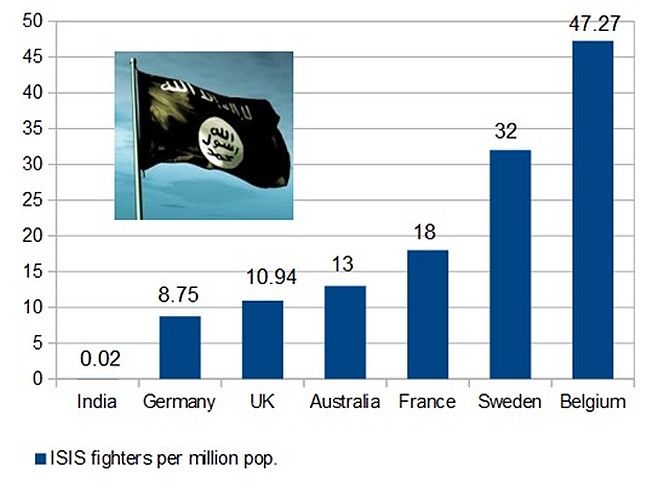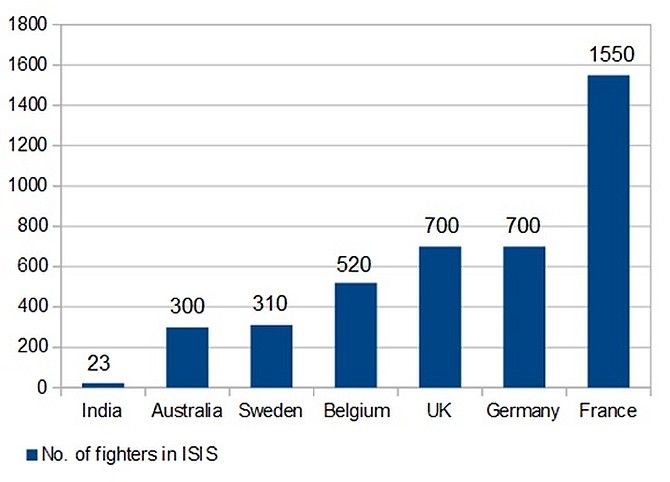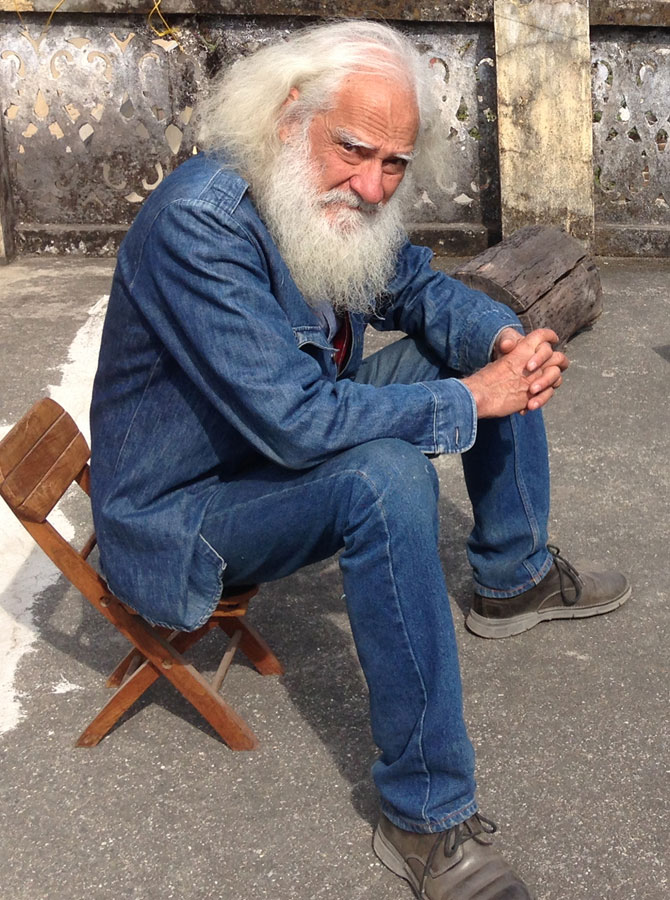
'It is folly to think that religious-identity-based politics and a flourishing economy can co-exist in a diverse society.'
'We can fight and kill each other, or fight together and kill poverty. We cannot do both,' says Dasrathi G V.
Per million population, the number of ISIS fighters from Belgium is 2,400 times more than that from India.
India's population is 54 times more than Australia's, but the number of ISIS fighters from India is one-sixth that from Australia.
India has the third largest Muslim population in the world, but a mere 23 people from India have joined ISIS.
The European Union's population is half that of India, but 5,000 people from the EU have joined ISIS.


| Population (million) | No. of ISIS fighters | Fighters per million population | |
|---|---|---|---|
| Belgium | 1.1 | 520 | 47 |
| Sweden | 9.6 | 310 | 32 |
| France | 66 | 1,550 | 18 |
| Australia | 23 | 300 | 13 |
| UK | 64 | 700 | 11 |
| Germany | 80 | 700 | 9 |
| India | 1,252 | 23 | 0.02 |
Do these statistics mean something?
The EU countries happen to be some of the wealthiest in the world, with housing, health, food, education taken care of. Everybody there should be satisfied, not yearning for Utopia, because they already are in Utopia.
On the other hand, India is a Third World country with extreme poverty, and abysmal quality and quantity of the basics of life.
How is it that Muslims in India are so disinterested in the idea of a Caliphate (that's what ISIS professes to be fighting for), a single Islamic theocratic nation straddling the whole world? What could be the reason?
The salad bowl concept of diversity suggests that the many different cultures combine like a salad, each retaining its own distinct qualities, not merging into a single homogeneous culture.
In the melting pot concept, there is a single culture that every citizen must change to, and abandon his or her original culture -- it's 'My way or the highway'.
India is a salad bowl, with a bewildering variety of religions, sub-sects, languages and skin colours. Each little collection of people has devised, and follows, unwritten rules on how to live with each other. There is no 'My way or the highway.' It is more like 'All right, you do it your way, and I'll do it mine.'
India in fact is the world's biggest salad bowl, with the highest variety of ingredients. India has learnt to live with enormous diversity.
Most of the first world countries have been melting pots till just a few decades ago, with maybe just one or a couple of languages, religions and skin colours. They were mostly white and Christian, in fact.
As they got wealthier, their populations dropped and they aged, and there are not enough people to do all the work that needs to be done. Now you are in a situation where you have to import people to do the jobs that your own wealthy citizens do not wish to do, or are too old to do.
You cannot import from another first world country, because they have the same problems and secondly do not want to migrate from one wealthy country to another. You import from a Third World country, and these imports are people with different skin colours, religions, languages, food habits, clothing.
You are face to face with people who are much poorer than you, worship some other strange gods that you've never heard of, eat weird food, dress in strange clothing. Now you say 'Ok, we've given you the privilege of letting you into our wealthy nation and living like us. We however detest your skin colour, your religion, your clothing, the whole of your old culture, and in return for letting you live here, we expect you to join the melting pot and abandon your old culture.'
The first generation immigrant came for economic reasons and was willing to join the melting pot, he put up with the prejudices and remarks of the locals, and still has roots in the original country.
The second generation immigrant considers himself a part of the adopted country, but is not accepted by the locals even though he speaks the language and is in all respects a part of the melting pot.
He wears jeans, has ditched the beard, eats local food, and yet is considered an outsider, is viewed with suspicion, doesn't get a job or only gets poorly paid jobs. At some point he's had enough, doesn't consider himself a part of his adopted country, has no other roots, and just wants to revenge himself against the adopted country and its culture.
Radical Islam and ISIS give him the perfect means. Marc Treavidic, the head examining magistrate in charge of France's anti-terrorism unit and author of numerous books about Islamists in France, says: 'Ninety percent of those who leave do it out of personal reasons: They are looking for a fight, or for adventure, or revenge, because they do not fit in society. Only 10 percent (of those who leave Europe to join ISIS) do so out of religious beliefs. Religion is not the engine of this movement and that’s precisely its strength.'
Migration is only going to increase in the future, and countries that were hitherto insular will have to deal with diversity. They are, however, not going to be able to do so overnight. It is going to take decades (or centuries) to learn to live with the kind of diversity that will be an inevitable fallout of the migration resulting from economic disparity between countries.
In India, everybody is a part of a minority community. Hindus worship thousands of gods, there are 70 sects of Islam, and many sub-sects in Christianity and Sikhism.
The combination of religion + sub-sect + language makes you a part of a small unique community that is a minority, irrespective of which religion or ethnicity you belong to.
There is no monolithic majority, and so there is no sense of a monolithic majority oppressing you, who belongs to a minority (although there is currently a political project to form an artificial majority of Hindus).
India accepts a person's differences, because it is forced to, just to survive.
Despite grievances against the State or against the rest of the population arising from politically inspired communalism and violence, the number of ISIS fighters from India can be counted on your fingers and toes.
In countries that are suddenly encountering diversity and haven't learnt to cope with it yet, there's going to be a lot of strife and violence while they adjust and learn. They are going to be spending a lot of time fighting instead of producing, and a lot of time and money fixing the effects of the fighting.
The salad bowl works, the melting pot doesn't. India, the world's largest salad bowl, is the perfect example of this.
When India was formed in 1947, it was actually 550 different countries with a huge diversity of gods and languages (the chief causes of strife anywhere in the world), joined together artificially as a single country.
Nobody expected India to survive as a nation. And yet we are surviving, and flourishing, 70 years later.
India was done with the 'adjust and learn' phase a long time ago. We don't have to spend time fighting instead of producing. While people in a lot of other countries are fighting amongst themselves, people in India can be working, producing and reducing poverty.
We in India are currently fond of talking of economic growth, GDP and production. Production requires capital, and this ability to live with diversity is the greatest component of India's capital (defined as a stock of accumulated assets, devoted to the production of other goods), that has been built over thousands of years.
This capital is, however, being eroded fast by our inability and unwillingness to live with our diversity. Over the past few decades, political parties at the Centre and in the states have created strife between religions and castes to get votes, rather than using development as a political strategy.
We citizens have been willing accomplices to this divide and rule strategy.
When a company's capital is eroded, it is called bankrupt. Let's not go bankrupt by eroding the greatest economic capital of our country, our ability to live with diversity.
It is folly to think that religious-identity-based politics and a flourishing economy can co-exist in a diverse society.
We can fight and kill each other, or fight together and kill poverty. We cannot do both.
Dasarathi GV is a Bengaluru-based enterpreneur and commentator.










